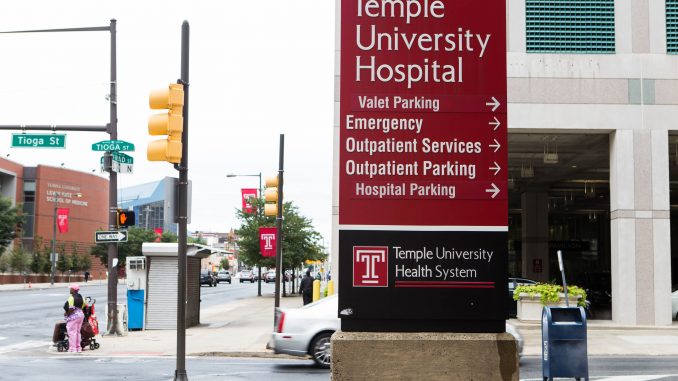
Dr. Nina Gentile strives to prevent life-threatening health conditions, but prevention “only goes so far,” she said.
“If we know what the right thing is to do, and we do it early, then more power to us and more power to the patients,” she added.
Gentile is leading Temple University Hospital’s participation in the National Institutes of Health emergency medicine clinical trials network as part of a five-year contract. TUH is now one of 11 regional hubs to operate Strategies to Innovate Emergency Care Clinical Trials Network, or SIREN.
What is SIREN?
SIREN’s goal is to rapidly implement clinical trials to test early treatments for heart, lung, blood, neurologic and traumatic injury conditions.
As a regional hub, TUH will coordinate clinical trials in emergency medicine at TUH and other network sites in the greater Philadelphia region.
Trials can take place in emergency departments, intensive care units and trauma centers — essentially any part of a hospital that deals with the earliest forms of emergency care, Gentile said.
A clinical coordinating center at the University of Michigan and a data coordinating center at the Medical University of South Carolina will also work on the trials in addition to the 11 regional hubs.
Funding
After funding for the trials is divided among the 11 hubs, the clinical coordinating center and data coordinating center, TUH receives money for each trial. The sum and source of the funds depend on each individual study.
Funding for the upcoming SIREN trials based at TUH comes from two places — the NIH’s National Heart, Lung and Blood Institute and the National Institute of Neurological Disorders and Stroke. Most upcoming SIREN trials tend to focus on treating heart, lung, blood and neurological conditions, Gentile said.
Who is involved?
Almost every clinical SIREN trial is “multi-disciplinary,” Gentile said. For example, a patient enrolled in a SIREN clinical trial could have treatment start in an ambulance or emergency department and end up in the hands of a neurosurgeon, with all of these caregivers being a part of a trial. Either way, emergency treatment trials “involve a whole team of people,” Gentile added.
TUH will also team up with hospitals, medical centers and trauma centers in Philadelphia and throughout Pennsylvania and New Jersey, which include some of the most “active and busiest” hospitals in the region, Gentile said.
The Temple SIREN network will work with Reading Health System’s emergency department in Reading, Pennsylvania, Cooper University Hospital in Camden, New Jersey and all level-one trauma centers in Philadelphia, like Einstein Medical Center and University of Pennsylvania Health System.
“If you can picture in your mind’s eye, we really include the busiest and the most concentrated in terms of population and density, in the area,” Gentile said.
Who will participate in the trials?
The first two SIREN trials are not “Exception from Informed Consent” trials, in which physicians can delay a patient’s consent to treatment because the nature of their injuries prevents them from providing it. These types of trials must follow certain U.S. Food and Drug Administration standards.
Instead, patients enrolled in the first two SIREN trials will be asked for consent prior to enrolling in the trial, but EFIC “is the reality” for emergency care research, Gentile said.
In order to conduct an EFIC trial in the TUH hub, subjects must be in a life-threatening situation where it is necessary to test treatments to an injury in order to determine what is the best treatment for the injury. It is possible that future trials in the SIREN hub could be EFIC trials.
To conduct one of these consentless trials, obtaining consent must not be possible, the subject must benefit from the research and physicians must determine if the research could not be done without an EFIC trial. If all of these standards are met, physicians can begin preparing for an EFIC trial.
Hannah Reimer is the project manager for Temple SIREN, leading community consultation efforts for trials in and outside the network. Notifying and creating a dialogue with the North Philadelphia community is the key aspect of EFIC trials, Reimer said.
Reimer’s primary way to educate the public about EFIC trials is by attending health fairs and community meetings. She said she also uses social media and press releases to share information about upcoming trials.
“When I first started hearing about EFIC trials, you pause for second and think, ‘How can you do research on somebody without their consent?’” Reimer said.
People often raise their eyebrows when Reimer does community consultations about EFIC trials, she added. Once she explains that there is no other way to study certain treatments, people understand why delaying consent is important.
“We need to know how to [take] care of people who can’t speak for themselves, who can’t consent to participate,” Gentile said. “Otherwise, we’re just doing the same thing over and over again without knowing whether we’re doing it right or wrong.”
What’s next?
Gentile said there are a number of studies currently “in the pipeline.”
But right now, TUH is preparing for the first SIREN trial at TUH, which will study the benefits of early hyperbaric oxygen therapy — when the oxygen in the blood is increased by 100 percent — in patients with traumatic brain injury, Gentile said.
TUH will team up with surgeons and experts in the Shock Trauma Center at the University of Maryland Medical Center. Most of the hospitals within TUH’s SIREN network will also participate in this trial, Gentile said.
The network is generating ideas for diseases we see every day, Reimer said.
“People have to know that we’re using tremendous expertise to treat conditions I find near and dear to my heart, which is the recently ill, the really sick, the severely-injured person,” Gentile said. “Without this type of network in place, it’s tough to piece together the best way to treat people.”



Be the first to comment